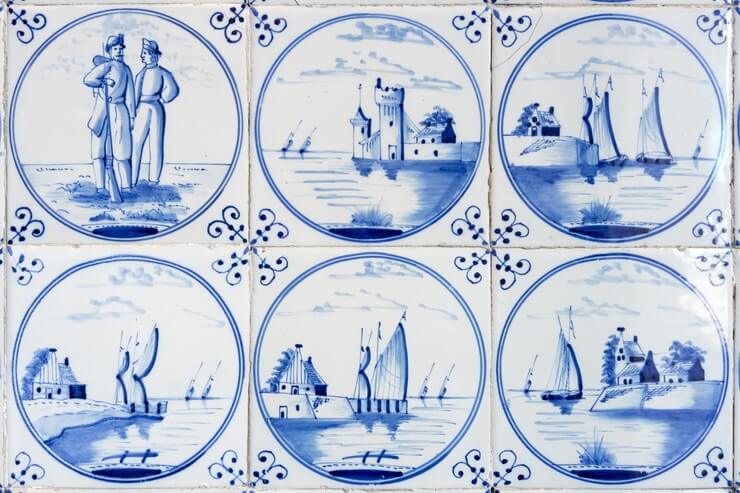Struggling with hard water stains on your shower tiles?
The right tiles can prevent damage and maintain a beautiful bathroom.
This comprehensive guide will show you how to choose the best shower tiles for hard water, explore ways to protect your existing tiles, and even introduce alternative materials that can withstand hard water’s harsh effects.

Is Hard Water Bad for Your Shower Tiles?
When compared to soft water, hard water simply has more minerals in it.
While hard water might be good for drinking in some cases, it can wreak havoc on your tile and other bathroom surfaces due to the extra mineral content.
The calcium and magnesium in hard water can damage your bathroom over a long period, resulting in damaged plumbing and water heaters and stained and damaged tile.
Hard water doesn’t damage the tile itself but instead will eat away at the grout and adhesive that hold the tiles together.
This causes tiles to fall and break and leaves the wall open to water damage.
Best Hard Water Resistant Shower Tiles
Glass Tile
Glass tile is one of your best options when it comes to resisting the effects of hard water.
Glass tile absorbs no water at all, while ceramic can absorb up to 3% water.
Glass tile’s ability to absorb zero water helps prevent hard water from attacking the adhesive that holds glass tiles together, it is also very easy to clean and looks impressive.
But glass tile does have some downsides.
For one, it’s challenging to install and is not recommended for the average DIY enthusiast.
So not only will you have to pay for installation, but you will also pay more for the material itself compared to porcelain and ceramic.
Glazed Ceramic Tile
Ceramic tile is a popular option found in many homes.
But when it comes to resisting hard water, glazed ceramic is a good choice.
Glazed ceramic is regular ceramic tile with an extra layer of sealant.
This extra layer of protection helps make it more waterproof and fight the effects of hard water.
In addition, glazed ceramic is durable along with being easy to repair.
But glazed ceramic tiles are far from perfect, and while they absorb less water than standard ceramic, they still can absorb water and have some other flaws.
Misusing glaze can bring on many cosmetic issues such as pinholes, blistering, or cracking.
As these cosmetic issues worsen, they can affect the water-resistance of your tile.
Glazed Porcelain Tile
Glazed porcelain carries many of the same advantages and drawbacks as glazed ceramic, with some key differences.
Porcelain is made of refined clays that make it more durable and scratch-resistant than ceramic.
This durability and the fact that it’s less porous makes glazed porcelain more resistant to hard water than glazed ceramic.
But glazed porcelain tile can also fall victim to the same cosmetic issues affecting glazed ceramic such as blistering.
As a result, glazed porcelain falls at a middle price point costing less than glass tile but more than glazed ceramic.
Alternatives to Shower Tile for Hard Water
Fiberglass
Fiberglass is becoming a popular alternative to tile for many reasons.
There is no grout for the hard water to eat away at when it comes to hard water concerns.
If you get fiberglass shower wall panels, there will be no adhesive for the hard water to damage either.
The only long-term effect hard water might have on fiberglass is staining it.
Acrylic
Acrylic, like fiberglass, is another popular tile alternative.
As with fiberglass, acrylic has no grout for hard water to damage.
Acrylic is a bit more durable than fiberglass.
But hard water can definitely stain acrylic.
Luckily, acrylic is very easy to clean.
This added durability and easy cleaning will cost you as acrylic is more expensive than fiberglass.
Stone Resin
Stone resin is a less popular yet very effective alternative to tile.
Stone resin usually comes in the form of shower wall panels.
Stone resin is much more durable than fiberglass or acrylic and is also impervious to stains or other damage caused by hard water.
But these fantastic qualities come with a price.
Stone resin panels are very heavy, difficult to install, and can be pretty expensive.
How to Protect Shower Tiles From Hard Water
Use a Water Softening System or Product
You can use a water softening system to get rid of the source of your hard water issues.
Water softening systems come in many different forms, with some using descaling systems and others using an ion-exchange method.
You should expect to pay around $500 for a decent quality water softening system.
An alternative to water softening systems is to use a water softening product.
These products come in a pellet, powder, or liquid form.
Water softening products cost much less than water softening systems.
You can get good quality water softening products for around $25.
The main drawback of these systems is you need access to your water’s source, such as private well water, and most people do not have a private well.
Regular Cleaning
Regular cleaning will keep your hard water from building up.
Besides getting rid of your hard water at the source, this is the best way to protect your shower tiles from the harmful effects of hard water.
For basic cleaning, soap, hot water, and a sponge are all that is required.
For hard water stains that have had time to set in and build up, you can use a solution of vinegar and water.
How often should you clean your shower tiles?
Once a week is recommended, although you can stretch this out to every two weeks if your shower is not heavily used.

